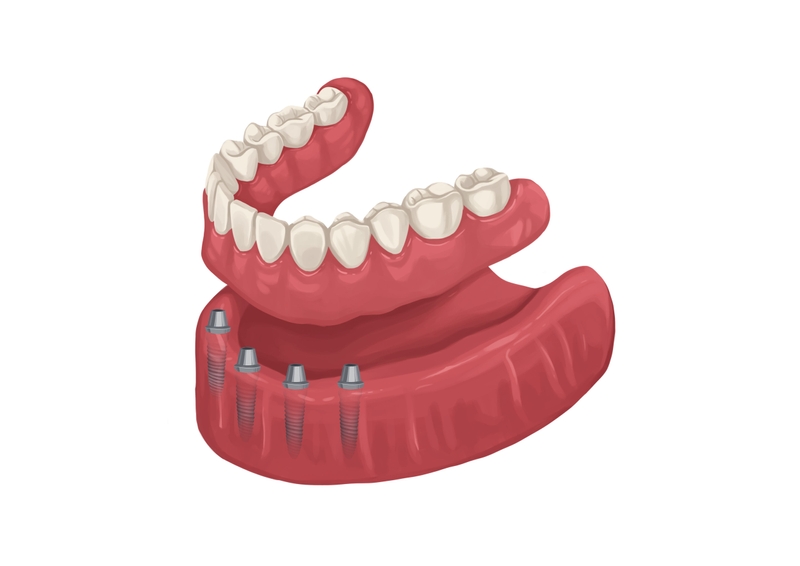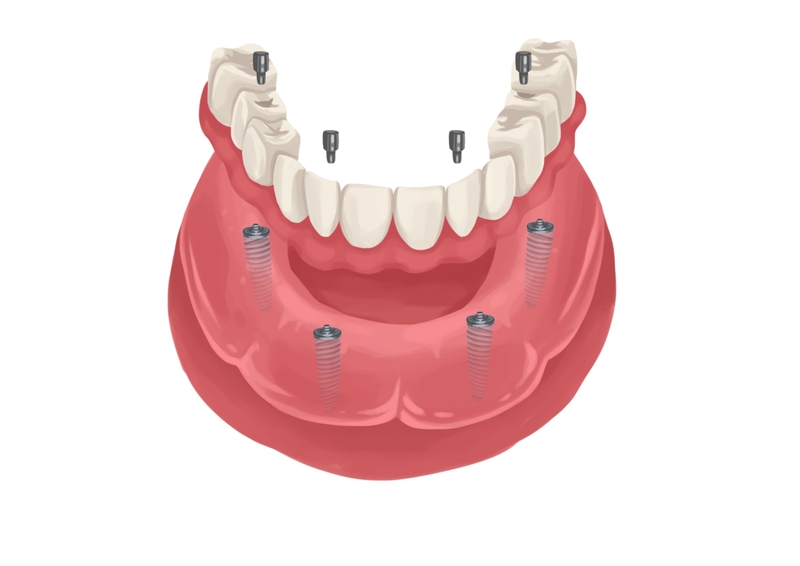- Permanent dentures or fixed dentures use dental implants for stabilization. The most common type of fixed dentures are All-on-4 implants.
- Fixed dentures are more stable, comfortable and require less effort for maintaining their hygiene. They also have a more natural appearance.
- Smoking and uncontrolled diabetes are contraindications to permanent dentures.
Use Authority Dental to book an appointment for the one-day dentures in your city, or sign up for a dental discount plan and save big on all dental procedures, including dentures.
What are the key differences between fixed dentures and conventional dentures? Here's everything you need to know.
What are permanent dentures?

Picture by Authority Dental under CC 2.0 license
Permanent dentures are held in place by at least two titanium dental implants. Some implant-retained dentures are still removable but benefit from the stability of being snapped onto the implants. Permanent dentures, however, are fixed in place and never need to be removed.
Permanent dentures are extremely stable and will not move when chewing, biting, talking, or smiling. The dental implants integrate with the surrounding bone, and then the permanent dentures are fixed to the implants. This results in a permanent solution for edentulous arches.
The most popular fixed dentures are called All-on-4 implants. As their name implies, this type of appliance uses four implants to support an entire arch of teeth.
Fixed dentures candidate profile
Not everyone is a good candidate for fixed dentures. However, most of the time, patients can make lifestyle changes to become ideal candidates.
First, individuals who smoke should not consider implants prior to smoking cessation. Implants have a high success rate - 98% - but that success rate is drastically reduced in those who smoke. Smoking impedes the body’s ability to heal, which will interfere with the osseointegration between the dental implant and the bone.
The same is also true for people with uncontrolled diabetes. This condition will also inhibit the healing process and can also lead to other oral conditions such as periodontal disease, also known as gum disease. As long as the diabetes is controlled, dental implants are a viable option.
With traditional dentures, patients needed to have enough remaining bone to act as a supporting structure for the dentures. Patients who had advanced bone loss had a very hard time wearing dentures since the ridge was no longer there to help keep them in place.
Implants are an excellent option for candidates that have had bone loss. A denture that is fixed in place with a dental implant will work on patients with any amount of bone loss. That being said, some may need bone grafting prior to implant placement.
Implant-supported dentures pros and cons

Picture by Authority Dental under CC 2.0 license
As with any treatment, there are advantages and disadvantages to implant-supported dentures.
We’ve discussed many of the advantages already. Permanent dentures are comfortable and function better than traditional dentures. They also look more natural and can enhance the wearer’s ability to taste. This is because the palate is often removed from fixed dentures.
Permanent dentures are expensive. They are an advanced type of treatment that requires more materials and more skill than other dental treatments, so they are more costly. They also require a longer treatment time since implants need to heal between their initial placement and when the dentures are placed.
Lastly, while implant surgery is not painful, patients must undergo minor surgery for the implants. This does cause some discomfort, which not all are willing to undergo.
Comfortable, natural appearance
More functional and stable
More ability to taste
More expensive
Longer treatment timeline
Requires surgery
Removable vs. fixed dentures
Even the best-fitting removable dentures will not fit as well as a fixed denture will. Patients will need to use denture adhesive and have multiple relines done at a local dental lab to get the removable dentures to stay in place.
Fixed dentures do not require as much maintenance. A fixed denture will also stabilize the supporting bone, unlike a removable denture. This is helpful because if too much bone is lost, a denture will not stay in place. Many individuals who have had removable dentures for a long time find that they are no longer able to wear their dentures.
FAQ
How long do permanent dentures last?
Dental implants can last an entire lifetime. However, you may need to replace the denture every 5-10 years. Normal wear and tear can cause the dentures to break down over time. The bone under the dentures will also remodel, which will require the denture to be relined to fit the tissue.
Are fixed dentures comfortable?
Fixed dentures are much more comfortable than traditional dentures. They do not move around and do not require denture adhesive to hold them in place. Fixed dentures make eating, speaking, and smiling easier and more comfortable.
How long does it take to get implant-supported dentures?
The process of getting an implant-supported denture can include a number of steps, amounting to several months of treatment. The timeline depends on if the patient has remaining teeth that need to be extracted and if the person requires additional procedures like bone grafting and tissue regeneration.
Once the implants are placed, they must be allowed to heal for several months while they integrate with the bone. A consultation with a dentist is the best way to find out how long it will take to get implant dentures.